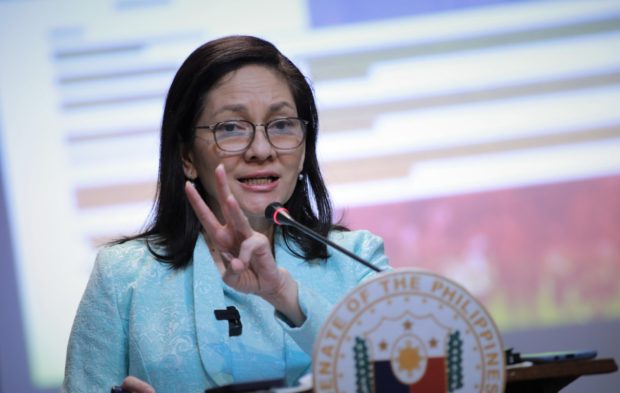‘Unprepared’: Critics see more farmers’ woes under RCEP

Sen. Risa Hontiveros (File photo from the Senate Public Relations and Information Bureau)
MANILA, Philippines — The lone dissenter in the Senate’s ratification of the Regional Comprehensive Economic Partnership (RCEP), Sen. Risa Hontiveros, stood pat on her position that the country was not yet ready to participate in the trade agreement and that it even stood to lose by worsening its trade deficit.
In her explanation of her vote, Hontiveros cited the petition of 131 organizations across the country registering their position against the RCEP ratification.
“[These are] farmer groups, fishermen groups, trade unions, health advocates, fair trade advocates. (They) represent millions of Filipinos who say that our country is not ready for this deal, that we already obtained the benefits from our other agreements, and that we even stand to lose,” she said.
Hontiveros made the statement on Tuesday night, moments after the Senate voted to ratify the deal.
She expressed doubts that the Philippines’ participation in RCEP could protect the country from the health and security concerns posed by the anticipated “onslaught” of tobacco and formula milk advertisements.
“While we may have a law banning tobacco advertisements, what if we get challenged for our noncompliance with RCEP? This was not our own doing, but I worry that the consequences may be grave and inter-generational,” she said.
The senator also cited the study of Rashmi Banga, a senior economist in the United Nations Conference on Trade and Development (UNCTAD-India), which claimed that the Philippines’ goods-trade balance would worsen by $264 million a year and that it would lose tariff revenues of $58 million annually.
“The calculations for me are simple, Mr. President. Our agriculture sector is slumped. We have not fully recovered from the effects of the pandemic. This is not the time for RCEP,” she said, addressing Senate President Juan Miguel Zubiri.
Farmers’ welfare
In her manifestation, Sen. Imee Marcos invoked what she called the legacy of her father, the late strongman Ferdinand Marcos Sr., in taking no part in the Senate vote to ratify the RCEP agreement, which has been aggressively pushed by her brother, President Marcos.
“It seems that the responses given to me [by the proponents] carried a hint of personal affront. I just wish to stress that my fear is based not on my relationships with the powers that be, but based on the legacy of my father that the welfare of the marginalized farmers and the needy should always be the top priority,” she pointed out.
“There is no winner in RCEP, as these ‘emergency measures’ as they are called, are mere ornaments and like a petty consolation because often, they are not used, they are not won,” she added.
Senator Marcos also raised concern on the effectiveness of the safety nets dangled by the proponents as supposed measures to protect the sectors that would bear the brunt of the country’s participation in RCEP.
“Here lies the problem because, as we have seen in the rice tariffication law, we were led to believe that funds were available. Yet studies show that the income of farmers fell by 40 percent,” she noted.
The senator also disputed proponents’ claims on the “great potential gains for the Philippine agricultural sector.”
“It is not clear how the sector can capitalize on these potential gains, given the sorry state of agriculture in this country. At present, we are struggling to provide basic agricultural services that were promised as early as 1994 with the WTO (World Trade Organization),” she said.
‘Grossly unprepared’
Critics of RCEP insisted on Wednesday that the Philippines’ agricultural sector remained “grossly unprepared” for further liberalization and bound to take the biggest hit after the country voted to join the world’s biggest trade pact.
The Samahang Industriya ng Agrikultura (Sinag) stressed that they would hold the Marcos administration accountable should the free-trade agreement hurt the country.
“We will remind and hold them accountable for what they promised, including withdrawing from RCEP if things turn out for the worse,” said Sinag executive director Jayson Cainglet.
He noted that there were existing rules and regulations to protect agricultural producers that were never carried out.
“We have enough laws that should have protected the sector, but they were never implemented,” he said.
Cainglet added that the free-trade mindset not only undermined the country’s food security but also its food sovereignty.
“The reverse happened, the free-trade regime made our country into a net food importing country; destroying our decades-old capacity to produce our own food,” he added.
In a statement, the Federation of Free Farmers also expressed disappointment over the Senate’s decision to ratify the trade agreement, as it called on the senators to “live up to their commitments” to address the long-standing problems plaguing the agriculture sector.
Promised gains
The group lamented that the senators gave more weight to the promised gains from the trade treaty, despite clear evidence that many sectors were ill-prepared for the challenges posed by the RCEP.
This deal would hurt local agriculture and aggravate the “fundamental problems of backwardness and maldevelopment in Philippine agriculture,” according to Kilusang Magbubukid Pilipinas chair emeritus and former Agriculture Secretary Rafael Mariano.
Even now, the sector continues to underperform and accounted for just 9.6 percent of the country’s gross domestic product, its smallest share in history, noted Ibon Foundation.
“As a free-trade agreement, we ask that we be wary of it as our economy has not prospered under FTAs,” it added, alluding to the country’s 20-year membership in the WTO.
Pamalakaya chair Fernando Hicap noted that even without the RCEP in place, the Philippines imported almost 200,000 metric tons of round scad and other fish from China, Vietnam, and Taiwan in the past five years.
“Now that the Philippines has formally joined the RCEP, large volumes of imported agricultural products are expected to flood our country,” Hicap said.